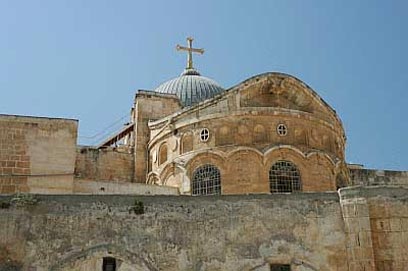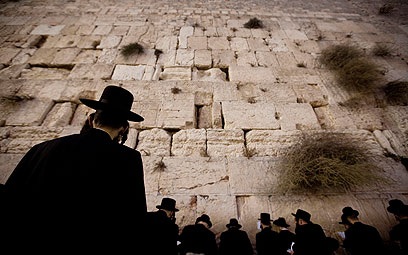
When Jerusalem Mayor Nir Barkat stares out at his city, the one-time venture capitalist sees fresh opportunity: He believes he can turn Jerusalem into one of the world's leading tourist destinations, on par with New York, Paris and London.
In a city known as much for its religious strife as its religious sites, this will be no simple task. But Barkat says he has a product that's easy to market. He confidently predicts a tripling of the number of visitors over the next decade.
"There are very few cities like Jerusalem that have such potential, with over 3.5 billion people on Earth who would like to come visit Jerusalem at least once in their lifetime," he said in an interview. "The brand Jerusalem is one of the most powerful brands in the world."
Since taking office in 2008 years ago, Barkat has presided over an ambitious development plan that has brought in new sporting and cultural events, opened a light rail system that has helped renew the long-neglected city center and boosted the number of international visitors by a third, according to the Tourism Ministry.
In April alone, some 300,000 people are expected for the Easter and Passover holidays.
Barkat says Jerusalem attracted some 3.5 million tourists last year. That number is higher than the 2.7 million figure the Tourism Ministry cites, a discrepancy probably caused by the difficulty of measuring day trips. Both are estimates, and part of the question is how many of the measurable population of overall tourists to the country come to Jerusalem.

Church of the Holy Sepulchre (Photo: Ron Peled)
Barkat says his goal of attracting 10 million tourists annually – about the level of Rome – is "just the tip of the iceberg of the potential of the city."
Jerusalem is Israel's leading tourist destination, attracting 80% of the country's tourists, Tourism Ministry says.
A magical city
The word "Jerusalem" takes on almost magical connotations for many. Holy to Judaism, Christianity and Islam, it is home to famed holy sites like the Western Wall, the Church of the Holy Sepulchre and the golden-capped Dome of the Rock.
History and intrigue seem to lurk inside every crevice of the city's cobblestone alleyways, bustling open-air marketplaces and parched hills.
The city also has a biblical zoo, a surprisingly vibrant nightlife and culinary scene, a top learning institution in Hebrew University, the respected Israel Museum and the Yad Vashem Holocaust Museum.
But problems also plague modern-day Jerusalem. It is among Israel's poorest cities, with rundown areas in both Jewish and Arab sections and an outdated road system often snarled with traffic. Relations between Jews and Arabs – and between religious and secular Jews – are often tense.

The Western Wall (Photo: Reuters)
Any attempt at development, no matter how well meaning, can be politically explosive, as Barkat himself has learned.
His plan to develop a ramshackle Arab neighborhood outside the walls of the Old City has run into fierce opposition from residents, who accuse the mayor of trying to cement Israel's control over the eastern part of the city.
Excavations have also sparked protests by Jerusalem's ultra-Orthodox population, which objects to any construction that risks disturbing ancient Jewish graves.
With 3,000 years of history, virtually every corner of the city is built upon an ancient burial site.
Opportunity vs. challenge
Tourism operators complain of more mundane problems. They say the dire shortage of hotel rooms and open space, narrow and overcrowded roads and a lack of parking are all serious constraints on future growth.
The lack of hotel space has driven up prices, with rates in upper-end hotels exceeding $450 a night.
Barkat has made clear he is addressing many of these areas saying that he expects current construction to raise the number of hotel rooms in the city by 20% to 12,000, and believes financial incentives will help double that number over the next decade.
Projects are in the works to build a 2,000-room hotel and convention center complex, with an eye toward attracting lucrative business travelers.

Dome of the Rock (Photo: Reuters)
Jerusalem is also building a massive sports complex built that will host the country's national soccer stadium, an 11,000-seat basketball arena and an Olympic size swimming pool, all for international competition. The complex is expected to be done next year, he said.
In the short term, Barkat, a culture buff and long-distance runner, has brought an array of street fairs and sporting events to the city. Last month, Jerusalem hosted its second annual marathon, drawing 1,500 international runners.
"Just having events physically located in the city, that creates a huge impact and a strong message that we're open for business," Barkat said.
Barkat added he is also working hard to streamline bureaucracy. He insisted Jerusalem is "far safer" than major US cities, despite the occasional violence that still makes headlines.
"Fighting an image is sometimes difficult, but the best way to fight it is to send 3.5 million good customers (home) every year, and that's where we are," he said.
––-















